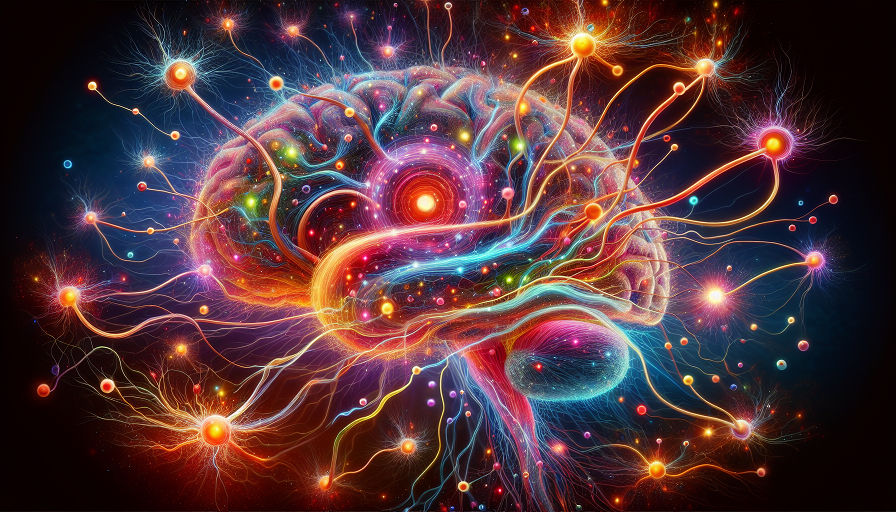
The phrase “you are what you eat” is particularly true when it comes to brain health. The food we consume directly impacts the structure and function of the brain, influencing everything from mood and memory to long-term cognitive resilience. Neurons — the cells responsible for transmitting information in the brain — rely on nutrients to perform their critical functions. Without the right nutrition, neurons can falter, affecting mental clarity, emotional balance, and even neuroplasticity, the brain’s ability to adapt and grow.
Contents
The Connection Between Diet and Brain Health
The brain is one of the most energy-demanding organs in the body, consuming roughly 20% of our daily caloric intake despite accounting for only about 2% of body weight. This high energy demand is largely due to the activity of neurons, which communicate through rapid electrical impulses. Proper nutrition is essential to sustain this activity and maintain the integrity of neural connections.
Nutrition affects brain health in several key ways:
- Providing Energy: Glucose, derived from carbohydrates, is the brain’s primary energy source, ensuring neurons can function efficiently.
- Supporting Neurotransmitter Production: Nutrients like amino acids, vitamins, and minerals are essential for synthesizing neurotransmitters, the chemical messengers that neurons use to communicate.
- Reducing Inflammation: Anti-inflammatory compounds in certain foods help protect neurons from damage caused by oxidative stress and chronic inflammation.
- Promoting Neuroplasticity: Nutrients like omega-3 fatty acids and antioxidants support the growth and adaptability of neural connections, enhancing learning and memory.
Key Nutrients for Neuron Function
A balanced diet provides the nutrients neurons need to thrive. Let’s take a closer look at the essential nutrients that directly support brain health:
Omega-3 Fatty Acids
Omega-3 fatty acids, particularly DHA (docosahexaenoic acid), are critical for maintaining the structure of neuronal cell membranes. DHA is a major component of the brain and supports synaptic plasticity, the process by which neurons strengthen their connections.
- Sources: Fatty fish (salmon, mackerel, sardines), walnuts, flaxseeds, and chia seeds.
- Benefits: Improved memory, reduced risk of neurodegenerative diseases, and enhanced emotional regulation.
Antioxidants
Neurons are particularly vulnerable to oxidative stress due to their high metabolic activity. Antioxidants neutralize free radicals, protecting neurons from damage and supporting long-term brain health.
- Sources: Berries (blueberries, strawberries), dark chocolate, spinach, and green tea.
- Benefits: Enhanced neuroplasticity, reduced risk of cognitive decline, and better overall brain function.
B Vitamins
B vitamins, particularly B6, B9 (folate), and B12, play a key role in neurotransmitter synthesis and the production of myelin, the protective sheath around neurons.
- Sources: Leafy greens, eggs, poultry, and fortified cereals.
- Benefits: Reduced brain fog, improved mood, and a lower risk of neurodegenerative disorders like Alzheimer’s disease.
Amino Acids
Amino acids are the building blocks of proteins and are essential for the production of neurotransmitters. For example:
- Tryptophan: A precursor to serotonin, found in turkey, dairy, and nuts.
- Tyrosine: A precursor to dopamine, found in eggs, fish, and soy products.
Glucose
As the brain’s primary energy source, glucose is crucial for neuronal activity. However, maintaining stable blood sugar levels is key; spikes and crashes can impair focus and cognitive function.
- Sources: Whole grains, fruits, and vegetables.
- Benefits: Sustained energy and improved mental clarity.
Foods That Harm Neuron Function
Just as certain foods support brain health, others can harm neurons and disrupt brain function. Diets high in processed foods, sugar, and unhealthy fats can lead to inflammation, oxidative stress, and impaired neurotransmitter balance.
Excessive Sugar
High sugar intake can lead to insulin resistance, inflammation, and oxidative stress, all of which impair neuronal function and contribute to cognitive decline.
Trans Fats
Found in processed and fried foods, trans fats can damage cell membranes and reduce the fluidity of neuronal connections, impairing communication.
Alcohol
Chronic alcohol consumption disrupts neurotransmitter function, damages neurons, and shrinks brain volume, particularly in the hippocampus.
The Gut-Brain Connection
Emerging research highlights the role of the gut-brain axis in brain health. The gut microbiome, the community of microorganisms in the digestive system, influences brain function through the production of neurotransmitters and immune signaling.
- Probiotics: Found in yogurt, kefir, and fermented foods, probiotics support a healthy gut microbiome, enhancing mood and cognitive function.
- Prebiotics: Foods like garlic, onions, and bananas feed beneficial gut bacteria, promoting a balanced microbiome.
Building a Brain-Healthy Diet
Supporting neurons through nutrition doesn’t require complicated diets or strict regimens. A brain-healthy diet emphasizes whole, nutrient-dense foods and minimizes processed options. Here’s how to create a meal plan that nourishes your brain:
Focus on Balance
Incorporate a variety of macronutrients (carbohydrates, proteins, and fats) and micronutrients (vitamins and minerals) to ensure comprehensive neural support.
Eat the Rainbow
A diverse range of colorful fruits and vegetables provides a spectrum of antioxidants and phytochemicals that protect neurons and reduce inflammation.
Stay Hydrated
Dehydration can impair cognitive performance, so ensure adequate water intake throughout the day.
Fueling Your Brain for Optimal Health
Nutrition plays a central role in brain health, directly influencing the structure and function of neurons. By prioritizing foods rich in omega-3s, antioxidants, and essential vitamins, you can support neuroplasticity, enhance cognitive function, and reduce the risk of neurodegenerative diseases. Equally important is avoiding harmful dietary choices, such as excessive sugar and unhealthy fats, which can undermine neuronal health.
The power of diet extends beyond individual meals; it shapes the long-term health and adaptability of your brain. By adopting a balanced, nutrient-dense eating pattern, you provide your neurons with the tools they need to thrive, paving the way for a sharper, more resilient mind at any age.

